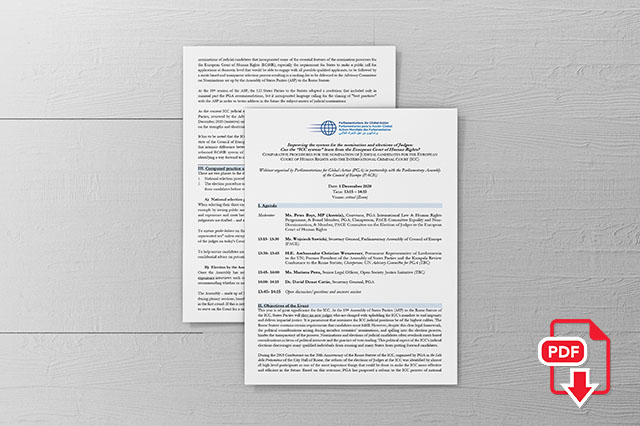The year 2020 has been of great significance for the ICC. The 19th Assembly of States Parties (ASP) to the Rome Statute of the International Criminal Court (ICC), has been earmarked for the elections of the ICC Prosecutor and the elections of the six new judges who are charged with upholding the ICC’s mandate to end impunity and deliver impartial justice. While the election of the ICC Prosecutor has been postponed to the early February 2021, the ICC judicial election process has culminated with the election of six judges at the resumed ASP session on 17-23 December 2020, held at the United Nations in New York.
In a critical time for the ICC, on 1 December 2020, Parliamentarians for Global Action (PGA), in partnership with the Parliamentary Assembly of the Council of Europe (PACE), co-hosted a virtual webinar on improving the system for the nomination and election of judges at the ICC, offering a unique opportunity to identify a way forward to ensure merit-based and transparent elections. The event, which counted with the participation of civil society organizations, members of parliament, and media outlets, included the following panel of leading experts moderated by Ms. Petra Bayr, MP (Austria) PGA Board Member and Member of the Committee on the Election of Judges to the European Court of Human Rights:
- Mr. Wojciech Sawicki, Secretary-General of the Parliamentary Assembly of the Council of Europe;
- H.E. Mr. Stefan Barriga, Deputy Permanent Representative of Liechtenstein to the European Union;
- Ms. Angela Mudukuti, Associate Advocacy Officer of the Open Society Justice Initiative; and
- Dr. David Donat-Cattin, Secretary-General of PGA.
Following the opening introduction provided by Ms. Petra Bayr, Dr. David Donat-Cattin, elaborated on the requirements contained in the Rome Statute of the ICC that candidates must fulfill to be elected as a judge of the world’s only permanent international criminal court. However, despite this clear legal framework, the political considerations arising during the national nominations’ phase, and spilling into the election phase, have hindered the transparency of the process. During the 2018 Conference on the 20th Anniversary of the Rome Statute of the ICC, organized by PGA in the Sala della Protomoteca of the City Hall of Rome, almost all high-level participants identified the reform of the elections of judges at the ICC as a critical aspect to make the ICC more effective and efficient in the future.
Based on this outcome, PGA proposed at the time a reform on the process of national nominations of ICC judicial candidates that could incorporate some of the essential features of the national nomination processes for the European Court of Human Rights (ECtHR). These include, in particular, the requirement for States to make a public call for applications at the domestic level while enabling the engagement of all possible qualified applicants, and the integration of a merit-based and transparent selection process resulting in a ranking list that should be delivered to the Advisory Committee on Nominations (ACN).
As an expert on the election of judges at the ECtHR, Mr. Sawicki convened that the election of judges at the ECtHR is carried through a transparent and impartial process given the importance of the role of elected judges who are expected to discharge sentences binding to all Member States to the European Convention. Additionally, Mr. Sawicki underlined that although the primary responsibility falls under the national governments to select the most qualified candidates, the Committee of Ministers has also played a key role in the process not only by developing a detailed guideline for the Member States, which include specific recommendations on how to proceed with the election of candidates, but also an explanatory memorandum containing good practices for each of the action points. Mr. Sawicki stressed, on the one hand, the importance of having a public call for applications that should be disseminated widely and, on the other, while bearing in mind the selection of candidates may be a political process, the utmost importance of ensuring that the body recommending and electing the candidates is independent and free from undue interference.
Mr. Barriga, who was involved in negotiating the rules for the election and nomination of the ICC judges in 2002, focused his intervention on how to improve the system. To that end, he argued that the ICC’s election process, which has a unique method to guarantee essential requirements through the so-called “minimum voting requirements,” has worked well at the Court. Nevertheless, the key to improving the system and the quality of judges, as he highlighted, is to reform the nomination process by strengthening the Advisory Committee procedure. Accordingly, he suggested making more powerful statements assessing the candidate’s qualification and encouraging more nominations by decoupling the nominations from the States’ initiative, given that the lack of the potential candidates’ links to their governments may unfortunately often hamper their candidacy.
To conclude, Ms. Mudukiti suggested improving the three layers of the process, namely, the national nomination, the election, and the review by the Advisory Committee on the Nomination of Judges. Regarding the nomination process, OSJI proposed States to first develop a national legal framework that governs judges’ nominations to the ICC, second, ensure that there is a period for public comments on candidates and gender parity within the lists, and establish an independent body in charge of scrutinizing each application before it goes forward.
The election of judicial candidates often overlooks merit-based considerations in favor of political interests and vote-trading practices. In that respect, Ms. Mudukuti affirmed that this unfortunate political aspect of the ICC’s judicial elections discourages many qualified individuals from running and many States from putting forward candidates. To offer a solution, Mr. Sawicki, while acknowledging that the nomination of candidates inevitably involves political considerations as it is a decision stemming from governments, suggested that the committees established to select the most qualified candidates should be composed of competent lawyers with a gender-balanced representation in order to carry a more objective assessment of the individuals.
Finally, Ms. Mudukiti stressed that although the ACN has carried out important work that has significantly improved several areas of this process within the ICC, other steps should have been taken. These include, for instance, making the assessment on the candidates’ qualifications available earlier during the year; extending the period for civil society organizations to submit recommendations, and disseminating it widely to allow more engagement from different stakeholders (for more information about the main issues on the nomination and election of Judges at the ICC, please refer to the OSJI Raising the Bar 2019 Report).
As emphasized by PGA’s Secretary-General and the panelists, the ASP of the ICC, thus has an important responsibility to elect the most qualified candidates following the guidelines and content already proposed by the ACN report. As the only permanent Court mandated to bring justice to victims and fight impunity for the worst crimes that shock humanity’s conscience, the ICC cannot afford to have inadequately qualified judges for this very important task.



